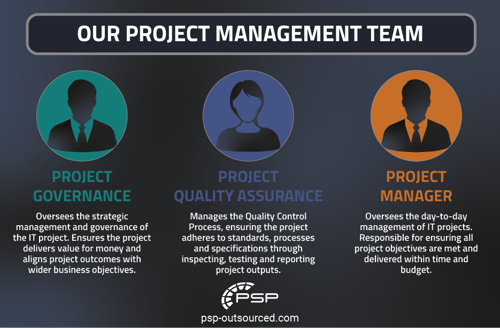80% of IT Projects Fail. Will yours?
3rd December 2024
The harsh truth about IT projects is that they frequently exceed budgets and expectations. According to Gartner, a staggering 80% of IT initiatives fail. Meanwhile, McKinsey research reveals that 17% of large-scale digital transformations encounter such severe challenges that they pose an existential threat to the companies undertaking them. But what are the main causes of these staggering statistics and what can be done to avoid scope creep and deliver your IT project on time and budget?
10 Reasons Why IT Projects Fail.
To better understand the main contributing factors that cause IT project failure, we have turned to our Digital Transformation team to highlight the key areas and find out how to avoid them.
1. Poor Planning
A successful project begins with a comprehensive plan. In our experience, inadequate planning is the main culprit behind cost overruns. When insufficient funds are allocated or resources are poorly distributed, you’ll inevitably face increased expenses as the project progresses.
2. Scope Creep
Scope creep happens when project requirements change without proper control mechanisms, such as formal change requests. These shifts often derail the project, leading to higher costs from increased workloads and additional resources.
Common causes of scope creep include unclear project objectives, poor requirements management, too many stakeholders and unrealistic goals.
3. Inadequate Risk Management
Every project comes with potential risks and poor risk management is a leading factor in project failure. It’s the Project Manager’s job to identify risks and develop a Risk Management Strategy to mitigate them.
Whether internal or external, unmanaged risks can jeopardise a project’s success, causing delays, financial losses and a knock-on effect on progress.
4. Vendor Issues
Issues with vendors (such as poor communication, low-quality service, or missed deadlines) can seriously affect your project’s budget.
To avoid these problems, choose vendors known for their reliability and customer service. When low-quality work or delays require fixing, it slows your project and incurs extra costs, especially if you need to source a new supplier.
5. Unrealistic Timetables
Setting unrealistic deadlines often causes projects to go over budget. Tight timelines may force rushed decisions, leading to less cost-effective or more expensive solutions.
The stress of meeting these deadlines can also compromise the quality of work, resulting in additional costs to resolve issues later.
6. Inaccurate Cost Estimates
Inaccurate cost estimates account for 28% of project failures. When budgets are based on poor estimates, unforeseen expenses, resource shortages and scope creep are almost inevitable, causing costs to spiral.
7. Lack of IT Project Management Experience
While Project Managers excel in handling budgets, timelines and teams, they may lack the technical expertise required for complex IT projects. This gap can lead to poor planning, scope creep and unexpected expenses.
Additionally, an unfamiliarity with IT vendors can result in poor vendor selection and inefficient spending.
8. Poor Communication
Good communication is essential to keeping a project on track and within budget. Stakeholders must clearly convey business goals to the Project Manager, who then communicates these effectively to the team, suppliers and contractors.
Poor communication leads to delays, duplicated work and escalating costs.
9. Technical Failures
Technical failures (such as poor system performance, unsuccessful data migrations, or low-quality outputs) often require expensive troubleshooting and repairs. Fixing these problems might involve investing in new technology or expertise, adding unplanned costs to your budget.
10. Inadequate Testing
After months of hard work, proper testing is the final, critical step that must not be overlooked. Inadequate testing can lead to bugs and errors being discovered post-deployment.
Not only does this damage your reputation, but fixing bugs after deployment is significantly more expensive than addressing them beforehand.
Don't Let Your IT Project Run Away From You. Talk To PSP.

Let’s Make Your IT Project a Success.
Need a Digital Strategy Roadmap?
Embracing digital transformation is no longer optional. It’s essential. This process requires thoughtful planning, cultural adaptation and substantial investment in technology. The payoff? Better customer experiences, streamlined operations and sustainable business growth, so let's talk.




